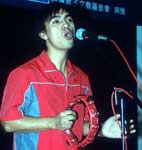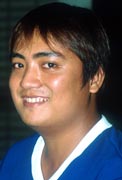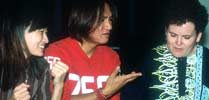|
|
HOME
> MUSIC
>
|

|
| *
aural cavity located on the sides of the head for insertion
of local music scene |
| compass
magazine, December 2001 |

Photo:
Henry Westheim © 2001
|
Advocating a Better Understanding
of Taiwan's Aborigines Through Music:
A COMPASS Interview with Biung
By Cheryl
Robbins
|
| Biung,
a member of the Bunun aboriginal tribe and up-and-coming musician/singer/songwriter,
grew up in a small village in the mountains of Taitung, where
music played an important part in everyday life. These roots
were reflected on his first album, "The Hunter", which
he produced during his last year of college and exclusively
recorded in the Bunun language. On his newest self-titled album,
however, he sings in both Mandarin and his tribal language.
At this year's Golden Melody Awards, Biung was chosen Best Male
Vocalist in the non-Mandarin category. During a recent tour
to promote his new album, Taiwan Fun's own Cheryl Robbins spoke
with him. Below are excerpts from that interview: |

Photo:
Henry Westheim © 2001
|

Photo:
Henry Westheim © 2001
|
C: How long
have you been interested in music?
B: I have been singing
since I was very young. I grew up in a remote mountain village
so there weren't the pastimes that city kids enjoyed, like
going to the movies. The children in my village liked to sing
together and have barbecues.
C: When was
it that you decided to make music your career?
B: A lot of people think
that what I am doing is making my interest my livelihood.
But, that's not exactly true. I don't have a concept of "job"
or "work". I don't want to give myself that much pressure.
|
|
C: How would
you describe your music?
B: My music is very related
to my experiences. It's not like pop. Pop is more fantasy-like.
My music includes old tribal legends, my experience of growing
up in an aboriginal village, and my feelings of leaving that
village to study elsewhere. It's very reality-based but with
a relaxed style.
C: Do you feel
it is difficult for an Aborigine to enter the music market?
B: There is still some
discrimination, but not as much as before. In the past, aboriginal
singers kept their aboriginal identity a secret or pushed
it into the background. Now, it is possible to make music
in aboriginal languages. It is more accepted because people
are starting to have more interest in aboriginal arts.
|

Photo:
Henry Westheim © 2001
|

Photo:
Henry Westheim © 2001
|
C: Are there
any local pop artists that you like or respect?
B: Taiwan is a small island,
so the pop industry is somewhat confined. I prefer foreign
pop music. In Western countries, there is a mix of musical
styles like R & B, reggae and soul. In Taiwan, I think that
innovation in music does not lie in the pop industry, but
in aboriginal music. Aboriginal artists, who are entering
the recording industry in growing numbers, mostly write their
own songs instead of doing remakes or translations of songs.
C: What do you
hope people will take away from listening to your music?
B: When people think of
Aborigines, they often think of vices like drinking. However,
aboriginal culture has many positive aspects, such as a deep
relationship with nature. What I know of my culture, I try
to pass on to others through music. I also hope to help people
understand that aboriginal music cannot be lumped together
in one category. Every tribe has its own music and style.
Therefore, I also want to pass on musical elements that are
unique to the Bunun culture.
|
| For
more information about Biung's latest album, see this month's
CD Reviews. |

Photo:
Henry Westheim © 2001
|
|
|
|
|
|
|